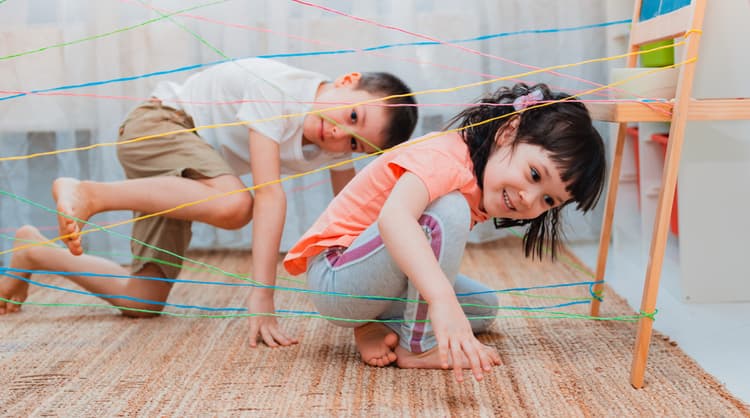How family dynamics influence career success

Education, socioeconomic status, personality and culture: all influential factors of one’s career choices and success. But could family play a vital part in one’s professional journey?
Perhaps. Various research and online discussions have spurred hot takes and debates surrounding the influence of siblings on one’s career success. Theories have circulated on the relationships between leadership and birth order, the impact of gender and age gaps, and effects of having siblings or lack thereof.
SkillsTalk discuss these influences below, and their potential impact on one’s career path.
How sibling relationships shape valuable career skills
With a sibling often being one’s first “play partner” or close friend, the relationship can serve as early training for understanding people and social cues.
Studies have pointed to the benefits of “pretend play”: the more siblings engage in such activity, the more likely they are to grasp empathy and comprehension of others’ emotions. Those who grow up with this learned behaviour will likely possess strong social or interpersonal skills as an adult – possibly even more advanced than those who grew up without a sibling. In fact, experts say that young children with older siblings develop “theory of mind” (the ability to place themselves in another’s shoes) earlier than their peers.
Such people skills are vital to succeeding in the workplace, as employers typically value those with sharp communication and relationship-building skills.
Additionally, fights between siblings can serve as training grounds for problem-solving and conflict resolution. Simple as they may be – those petty squabbles over toys or a preferred TV channel can build one’s abilities in navigating greater, more serious social disputes (whether at work or in your personal day-to-day).
It’s important to note, however, that such effects hinge on the quality of one’s sibling relationship. On the flipside, negative dynamics often have a critical impact on one’s adult well-being, such as peer problems and a tendency for coercive behaviour.
Positive sibling dynamics are more likely to foster in healthy, organised home environments with parents who also have a strong, positive relationship. This thus points to a domino-type effect – a good home environment can lead to positive sibling relationships, which, in turn, leads to positive social skills for your career and beyond.
The influence of gender, age gaps, and birth order

Online circles have theorised the likelihood of first-borns to become workplace leaders, with plenty of anecdotal evidence to support this: world leaders such as Barack Obama, Angela Merkel, and George W. Bush were all the eldest siblings, for example, along with tech moguls such as Elon Musk and Jeff Bezos.
On the other hand, the last-borns have been deemed as more adventurous, experimental, and risky compared to their other sibling(s).
While a handful of cases may lend weight to these statements, scientific research has extensively debunked this – including a large U.S. study of nearly 400,000 secondary students, conducted by Rodica Damian and Brent Roberts from the University of Illinois. Their findings found little to no association between one’s birth order and personality traits, much less their leadership abilities.
Similarly, Tomas Lejarraga of the University of Balearic Islands found little relationship between last-borns and risky behaviour, debunking the theory of their innate adventurousness.
A case can be made, however, for age gaps and sibling genders. One study found that men with older female siblings tended to be less competitive. Others have pointed to their tendency of endorsing more “egalitarian gender roles”, perhaps due to growing up with an older, stronger, and wiser female peer.
The age gap between siblings is also critical to developing valuable social skills; as those closer in age have a greater likelihood of playing, competing, and learning from one another.
The career effects of being an only child
So what does all this mean for the “only child”?
While researchers have found notable behavioural differences between “only children” and those with siblings, their findings point to both negative and advantageous effects.
A study focused on the “one-child policy” in China – assessing the character differences between those born before and after it was implemented – found that the children in the latter half were less trusting, less adventurous, less competitive, and more pessimistic overall.
While this could pose concern for future workplace opportunities, it’s important to note that the sample predominantly comprised of children, and thus have time to hone such skills in their developmental years.
Another study found that only children scored lower on tests for “agreeableness”, displaying less trust, friendliness, and socially positive behaviours. However, the same study also found that only children scored better on tests of creativity, compared to those with siblings. This could be linked to greater parental expectations, higher levels of parental attention, and the greater time spent alone with their imagination.
Unsurprisingly, only children have also been found to be more independent. Experts have drawn possible connections to all their time spent playing alone; which may have helped them form a greater sense of personal ability and confidence. Multiple studies have also pointed to higher levels of ambition, linking this to their lack of competition for their parents’ attention.
Parents of only children are more likely to notice and reward their child’s achievements, helping them form clearer aspirations and stronger self-drive – both traits vital to one’s pursuit of career success.
Ultimately, career success depends on you

Different sibling dynamics can leave one predisposed to specific social skills or character traits, though most can be learned or improved on as one grows. Family may help shape our future career paths and opportunities, though we ultimately control what we wish to become and achieve.
Looking to broaden your career opportunities?
Upskilled currently offers a wide range of courses to help build your skills for workplace success. Hone your technical skills for a digital future, sharpen your business wits, or explore your desire to help others through counselling and community services. Best of all – they’re delivered online, helping you tailor your training around personal needs and schedule.
Build skills for a job you love, and enquire with us on a course today.


)
)

